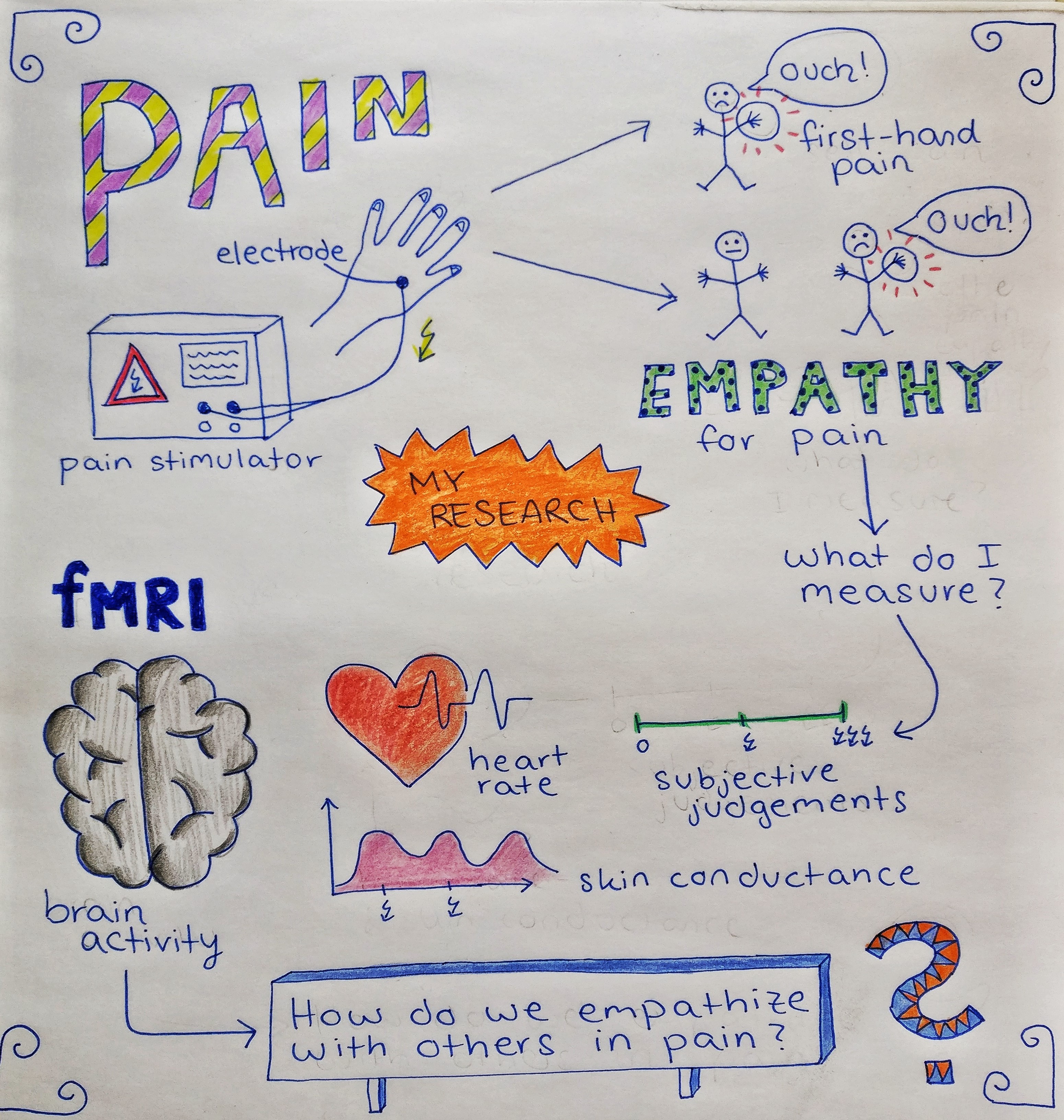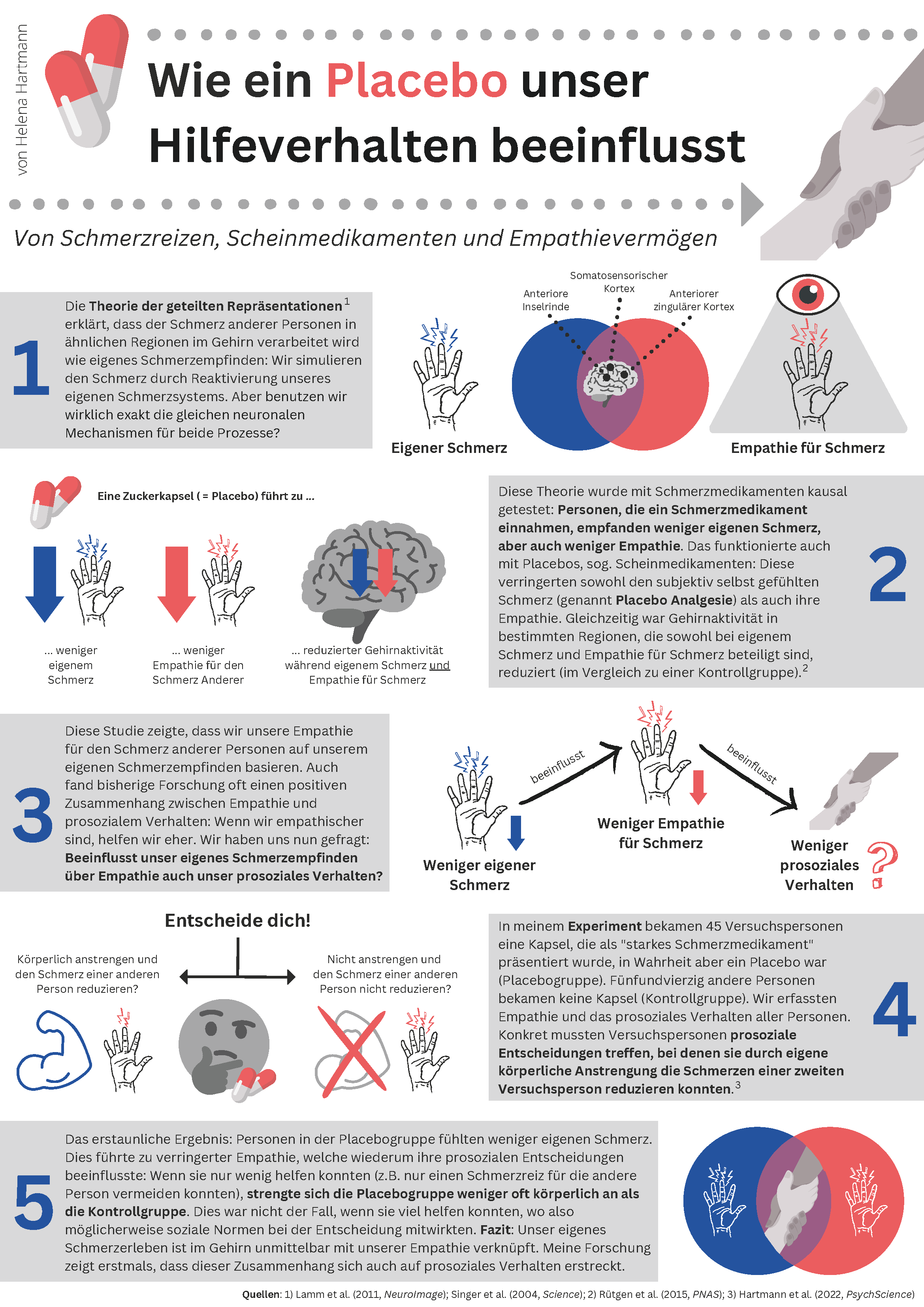Dr. Helena Hartmann
Neuroscientist, psychologist and science communicator (she/her/hers)
Bingellab, University Hospital Essen
SFB/TRR 289
Biography
I am interested in factors that influence how we perceive pain in ourselves and in other people. To investigate this, I use neuroimaging, psychopharmacological and behavioral experiments. My approach to science strongly aligns with open science principles. Next to my work as a researcher, I enthusiastically engage in and teach science communication.
Interests
- Pain processing and modulation
- Expectations & placebo/nocebo effects
- Empathy & prosociality
- Science communication
- Open science
- Feminist research
Education
-
PhD in Social Neuroscience, 2022
University of Vienna, Austria
-
MSc in Clinical & Biological Psychology, 2017
University of Vienna, Austria
-
BSc in Psychology, 2014
University of Vienna, Austria
Affiliations
Since mid 2022, I am working at the Bingellab (Clinical Neurosciences) at the University Hospital Essen as a postdoctoral researcher. I did my PhD from 2017-2022 at the Social, Cognitive and Affective Neuroscience Unit at the University of Vienna. In 2021/2022, I was a visiting researcher in the Social Brain Lab at the Netherlands Institute for Neuroscience in Amsterdam.
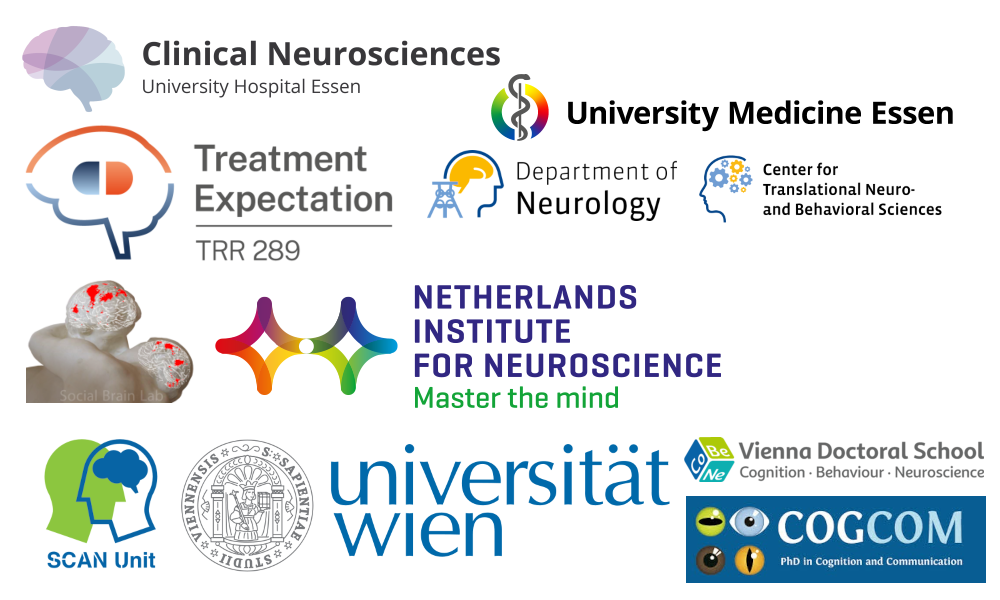
Activities
Society member
DGPs - Biological Psychology and Neuropsychology, IGOR, Society for Interdisciplinary Placebo Studies, IASP
Board member of FORRT Germany e.V.
Action editor
Collabra: Psychology, In-Mind Magazine, PCI Registered Reports
Outreach manager and science communicator
SFB/TRR 289, S4SN, Social Media, Print, Blogging, Podcasts, Videos, Events
Data collection
Behavior, pain, effort, heart rate, skin conductance
Data analysis
RStudio, JASP, Matlab, SPM, fmriprep, FreeSurfer
Research
My research word cloud
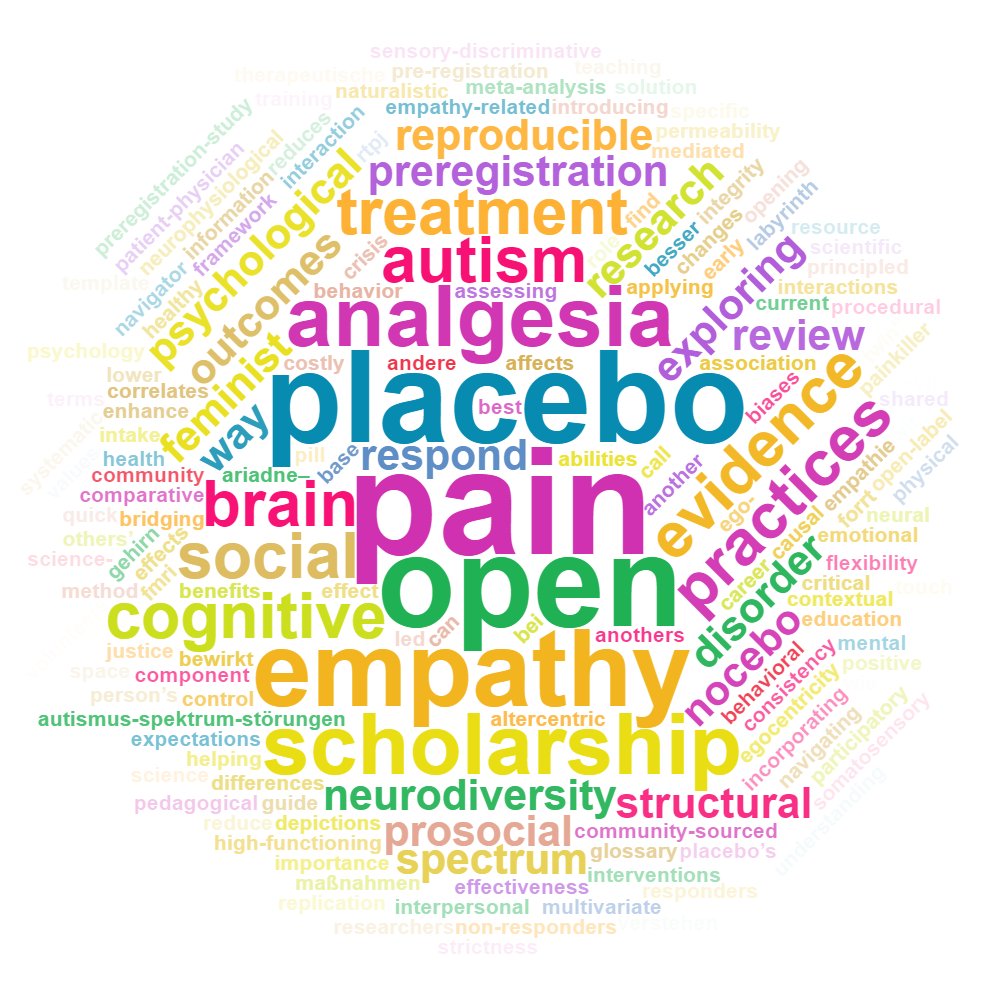
What are the behavioral and neural mechanisms underlying pain modulation via different treatment expectations?
In my Postdoc, I am using fMRI combined with placebo hypoalgesia and nocebo hyperalgesia to investigate the cognitive modulation of first-hand pain perception. Specifically, as part of the Collaborative Research Center 289 “Treatment Expectations” I am interested in the modulating role of positive and negative expectations on real and fake treatments as well as mechanisms of open-label placebos.
More info about treatment expectations and the CRC/TRR 289 can be accessed here. You can also follow us on Youtube or Instagram, and watch our recent animated films on the placebo and nocebo effect:
How do we empathize with another person in pain? What role does our own pain perception play?
My PhD research focused on the behavioral and neural mechanisms underlying shared representations between first-hand and empathy for pain, as well as their connection to prosocial behavior. Specifically, I was interested in 1) the necessity of somatosensory brain regions for feelings of empathy, and 2) whether we need our own pain processing system to empathize with and help others in pain. In my Postdoc, I am investigating how people with chronic pain conditions understand, share, and react to the pain of others.
Below is a short animation of my PhD research made by Scientistt:
You can also watch a video of my PhD defense presentation:
How can we improve the openness, transparency and reproducibility of research, scholarship, and education?
I am a community manager at Framework for Open and Reproducible Research Training (FORRT). I am co-leading the Replication Hub. I am also involved in multiple other projects, such as the glossary, neurodiversity and impact for students projects. FORRT is always looking for new contributors and collaborators, so learn how to get involved here.

Mentors
- Ulrike Bingel (Postdoc supervisor, Bingellab, University Hospital Essen, Germany)
- Valeria Gazzola and Christian Keysers (Visiting PhD supervisors, Social Brain Lab, Netherlands Institute for Neuroscience, Netherlands)
- Claus Lamm (PhD supervisor, SCAN Unit, University of Vienna, Austria)
- Giorgia Silani (Master thesis supervisor, Clinical Neuroscience Unit, University of Vienna, Austria)
Collaborators
- The Feminist Wonderlab Collective
- The Peer Review Study Collective
- The Placebo Imaging Consortium
- The Contributorship Collaboration
- Jonas Potthoff (University of Graz, Austria)
- Patrick Barclay (Barclay Lab, University of Guelph, Canada)
- Julian Packheiser (Social Neuroscience Lab, Ruhr University Bochum, Germany)
- Markus Rütgen (SCAN Unit, University of Vienna, Austria)
- Philipp Kanske (Psychopathology of the Social Brain Group, University of Dresden, Germany)
- Przemysław Bąbel (Pain Research Group, Jagiellonian University, Poland)

Publications
Find my Google Scholar profile here and my recent publications below. I provide PDFs of my work whenever possible. If you cannot find a paper, please email me at helena.hartmann@uk-essen.de and I will send it to you.
Journal articles
Nocebo effects are stronger and more persistent than placebo effects in healthy individuals
The association between test anxiety, learning strategies, and open-label placebo effects on academic test performance: a secondary analysis of a randomized controlled trial
Bridging neurodiversity and open scholarship: How shared values can guide best practices for research integrity, social justice, and principled education
Incorporating feminist practices into psychological science - the why, the what and the how
Conference posters
Behavioral and neural underpinnings of positive/negative treatment expectations and effects on pain
- Society for Interdisciplinary Placebo Studies conference (2025)
- World Congress of the International Association for the Study of Pain (2024)
- Psychology and Brain conference (2024)
- Psychology and Brain conference (2023)
- Society for Interdisciplinary Placebo Studies conference (2023)
- Society for Interdisciplinary Placebo Studies conference (2023)
- Society for the Improvement of Psychological Science conference (2022)
Collaborative hackathons for FORRT’s “Replications and Reversals in Social Sciences” project
- Society for the Improvement of Psychological Science conference (2022)
- Association for Interdisciplinary Metaresearch and Open Science (aimos) conference (2021)
- Psychological Science Accelerator (PSACON) conference (2021)
- Psychology and Brain conference (2022)
- Austrian Society for Psychology conference (2022)
- Psychology and Brain conference (2021)
- Society for Social Neuroscience conference (2021)
Engaging with Open Science as Feminist Early Career Researchers: 6 Top Tips
- Open Science conference (2021)
- International Association for the Study of Pain (IASP) Virtual Series on Pain & Expo (2020)
- IMPRS Neurocom Summer School (2019)
- Organization for Human Brain Mapping conference (2019)
- MindBrainBody Symposium of the Max Planck Institute for Human Cognitive and Brain Sciences (2021)
- Society for Neuroscience Global Connectome (2021)
- Organization for Human Brain Mapping conference (2019)
- Self-Knowing-Others Workshop (2018)
- International Society for Autism Research conference (2018)
- Social Brain Symposium (2018)
- Society for Psychophysiological Research conference (2017)
- Salzburg Mind Brain conference (2017)
Talks
I am always happy to give talks about my research, science communication and open science, both scientist-to-scientist and scientist-to-public. Contact me via helena.hartmann@uk-essen.de.
Invited talks
As part of the Feminist WonderLab I gave a talk on “NOpen science and feminist psychology – a dream team?” at the Lübeck Open Science Initiative. Find the slides here.
The Framework for Open and Reproducible Research Training (FORRT) presented many of their great projects at a webinar hosted by the Center of Open Science (my talk on the Replications & Reversals project starts at 8:23):
I talked about first experiences and lessons learned when preregistering an fMRI study at the Methods Meeting of the Institute of Systems Neuroscience in Hamburg. Find the slides here.
I gave a short presentation about a study where I investigated the effects of placebo analgesia on prosocial behavior at the 2021 Society for Social Neuroscience conference:
This is a talk I gave at the online lecture series OnNeuro about parts of my PhD on the role of the somatosensory component of pain processing in empathy:
Below is a short talk about the effects of placebo analgesia on interoceptive abilities that I gave as part of the symposium “From heart to brain and back: novel findings and methodological challenges in interoception research” organized by Federica Riva and myself at the 63rd Conference of Experimental Psychologists (TeaP):
Teaching
Lecture “Science for Everyone! Science Communication for Beginners” - slides (University of Vienna, 2020) and updated slides (BIOME lecture series, University Duisburg-Essen, 2022).
Lectures “Doing Good/Open Science” (University of Vienna, 2019 & 2020):
Open Science
Resources
- Do you want to get an overview of available resources to conduct a research project? Look no further: We created ARIADNE, a scientific navigator to help you navigate the research cycle. Read the website or browse the tool. You can also read the associated publication which guides you through a first research project here.

-
Check out my awesome-PhD GitHub repository that includes a curated list of carefully selected tools and resources I wish I knew when starting my PhD. Please feel free to contribute more resources! Also have a look at the Twitter thread where I started this list.
-
For information about replications, check out the FORRT Replication Hub, the associated R package, and the Handbook for Reproductions and Replication Studies.
-
Have a look at the fMRI preregistration template I helped update.
Have a look at some of my preregistrations and open data/code on the Open Science Framework here or browse my open fMRI datasets:
- Cyberball task for use in individuals with autism spectrum disorder from Hartmann, Lengersdorff et al. (2021, Frontiers in Psychiatry)
- Picture-based empathy for pain task from Hartmann et al. (2021, Cerebral Cortex Communications)
- Cue-based empathy for pain task from Hartmann et al. (2021, NeuroImage)
- Personal space task in autism spectrum disorder from Massaccesi et al. (2020, Cerebral Cortex)
Outreach
Do you want me to give a science communication workshop? Are you interested in interviewing me about my research or do you want me to write something for your media outlet? Contact me via helena.hartmann@uk-essen.de.
Written Work
- Check out my science communication project Science & Fiction, a place where scientific results and fictional stories intersect. The German version can be found here.
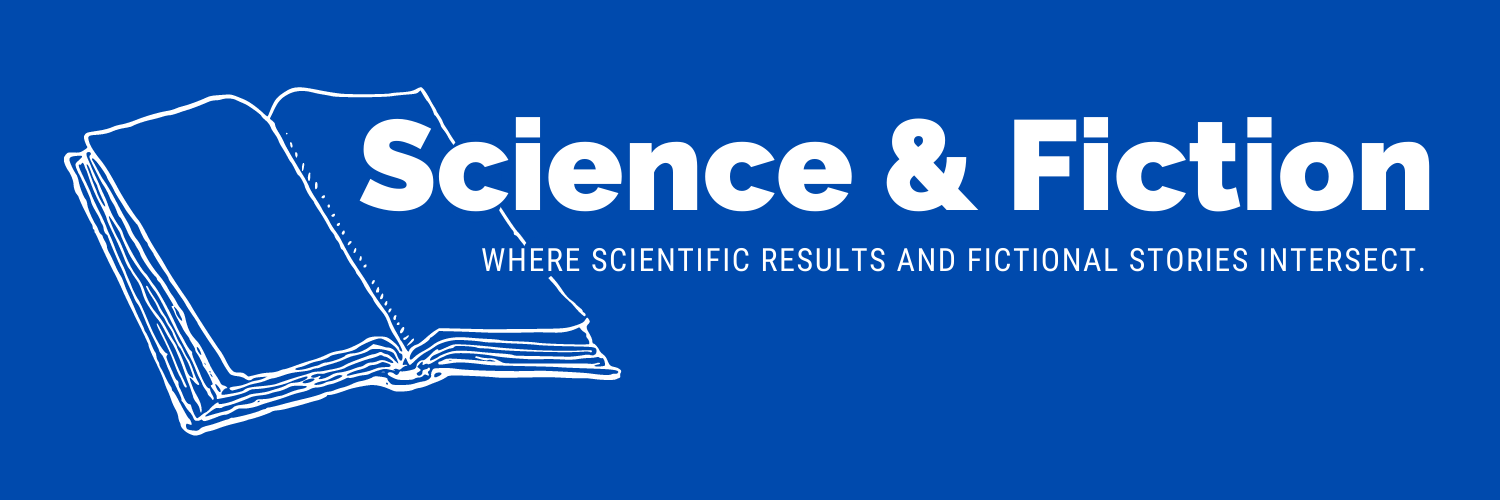
-
I wrote an article about sharing pain of others in one’s own brain for the German Gehirn & Geist magazine: “Dein Leid ist mein Leid”.
-
Together with Ulrike Bingel I wrote an article about nocebo effects for the German Gehirn & Geist magazine: “Wenn der Beipackzettel krank macht”.
-
I co-wrote two articles for children between 12-15 years about the nocebo effect. The English version was published in Frontiers for Young Minds under the title The nocebo effect: The placebo’s “evil twin”. The German version was published in The Inquisitive Mind and was part of a special issue I edited with articles for children.
-
Together with Claus Lamm, I answered a question for the German Gehirn & Geist magazine: “Was bewirkt Empathie im Gehirn?”.
-
I was part of a German blogpost for the In-Mind magazine on “What is open scholarship? And why does it need a dictionary?”.
-
As part of IASP’s 2022 Global Year of Translating Pain Knowledge to Practice, I co-wrote a fact sheet about treatment expectations and the patient-physician interaction. The fact sheet is available in English, German, Japanese, Portuguese, & Spanish.
-
I wrote a German In-Mind article about empathy and how we share the emotions of others, together with Markus Rütgen and Claus Lamm. Read the full article here.
-
I also contributed two entries to the In-Mind glossary: Theorie der Geteilten Repräsentationen and Endogenes Opioidsystem.
Podcast appearances
Here’s a playlist of all the podcasts I was a part of.
-
Bradley van Paridon and I had a conversation about why expectations and the placebo effect matter on his podcast Two Brad for You.
-
The Kaleidoscience podcast interviewed me about how empathy for other people’s pain makes us feel.
-
Jordan Harbiger and I debunked placebo and nocebo effects in a Skeptical Sunday episode on the Jordan Harbiger Podcast.
-
Waywen Loh and I chatted about science communication, open scholarship amongst academics and science storytelling through fiction on his podcast Research Insider.
-
Kevin Mercurio and I talked about storytelling science on his podcast Metaphorigins.
-
Katja Kaurinkoski and Pritakshi Das from The Science Basement Podcast asked me all about my work on pain in the episode on The Anatomy of Agony: Deciphering Pain Perception.
-
I raved about research on placebos, nocebos and empathy in the German podcast Hirnfunk by Elisa Warmuth.
-
Clara Marx from the science communication podcast Clarified interviewed me about my project Science & Fiction.
-
I talked to Lee Delaney from Curiosity Cake about my PhD, specifically what kinds of methods I employ to measure empathy for pain in brain and behavior.
-
I was so lucky to be part of the episode “Ever Felt Someone’s Pain… In Your Butt?” by Every Little Thing. Learn all about vicarious pain and how we can feel someone else’s pain in our own body.
-
I chatted with Aaron Halliday about my research on empathy, prosocial behavior and interoception, but also about making science relevant and accessible to everyone.
Events
-
I am a trainer for the NaWik and give workshops on science communication basics, social media, writing understandably, and scicomm in grant applications. Check out my profile there.
-
I participate in Letters to a Pre-Scientist, who pair middle schoolers with scientists, engineers, and technologists from around the world through snail mail. These personal connections shatter stereotypes, spark curiosity, and help students see themselves in a STEM career.
-
I gave German webinars at the VHS Vienna about “Das hilft mir bestimmt (nicht)! Wie positive und negative Erwartungen unsere Schmerzwahrnehmung beeinflussen” (slides here).
-
I participate in Skype a Scientist, where I last met online with three school classes of 3rd graders from Memphis to present my work as a pain and brain scientist. I am also listed on Ring a Scientist.
-
I walked around the 2023 SIPS conference (Society for Interdisciplinary Placebo Studies) together with the guys from PhysioBib and they created a video out of it (in German):
- I organized and moderated the science slam at the 4th conference of the Society for the Interdisciplinary Placebo Studies. You can watch it below:
-
I participated at the Self Help Day 2022 and 2024 of the University Medicine Essen and educated patients and stakeholders about treatment expectations.
-
I was part of a Children’s University workshop at the University of Vienna, where we taught children about the brain, perspective taking and empathy. I also do courses for kids at the Junioruni Essen.
-
Here I explained my research on empathy for pain and prosocial behavior in German at a science communication format called Kaffeeklatsch mit Wissenschaft hosted by the amazing Franziska Sattler in February 2021. Find the slides to this talk here.
- Pint of Science (PoS) brings scientists to share their latest research with you! I was part of 2020’s “Beautiful Mind” event manager team to organize three exciting evenings all about neuroscience that were unfortunately cancelled due to COVID. In 2021, I also helped organize online events for PoS Amsterdam in 2021 (see for example here or here). More info on the Website.
- Together with my PhD colleagues, I organized a booth at the Long Night of Research in Vienna all about research in psychology and social neuroscience in 2018. Have you ever experienced the rubberhand illusion? How do we investigate something called affective touch? Can we put awake dogs into an MR-scanner? And can you match all brains to their corresponding species?
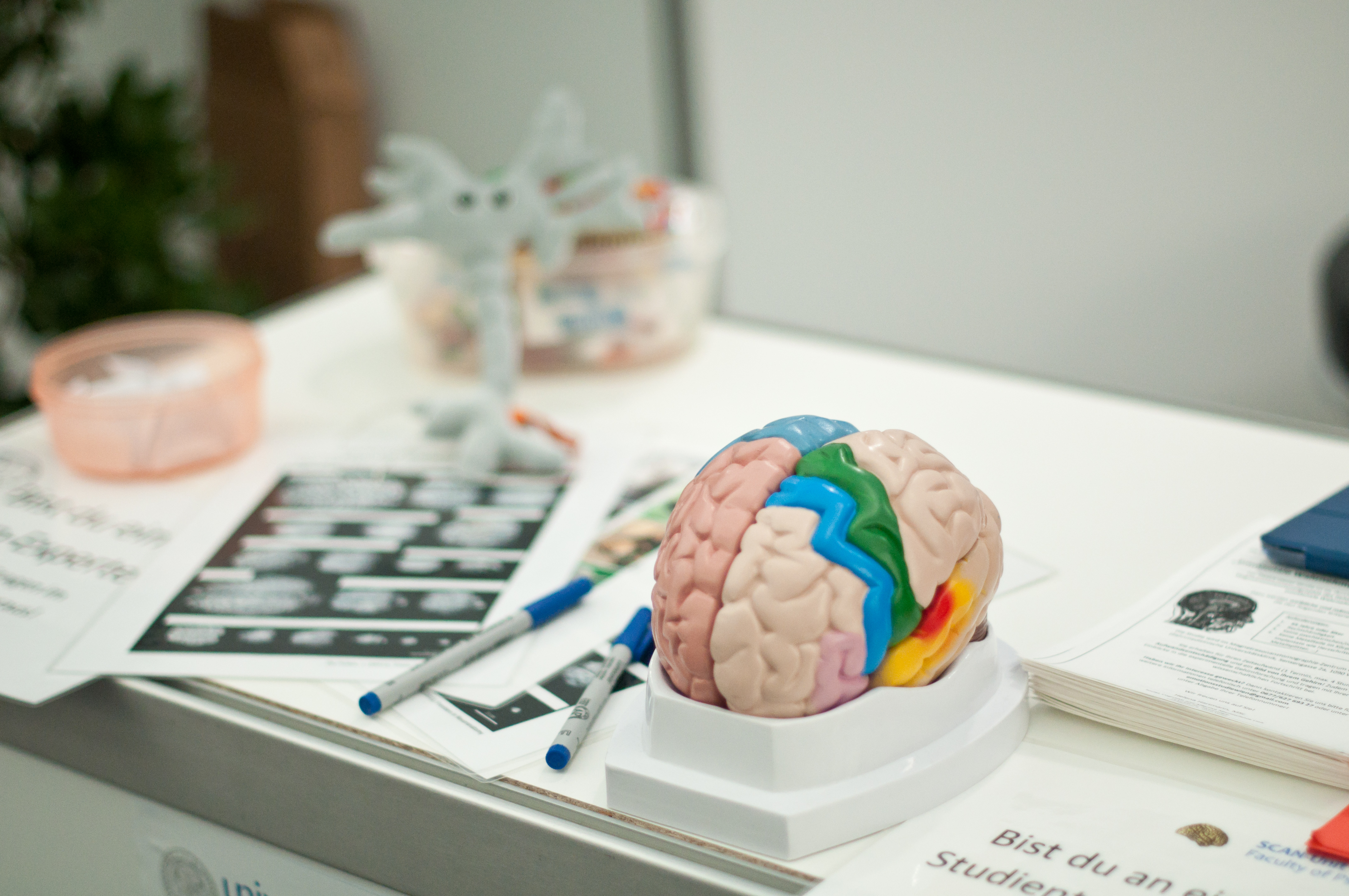
-
Art of Neuroscience: Have a look at my application for the art competition all about neuroscience here.
-
Photo Competition “My Research in one Picture”: In 2018, my photo about my PhD research titled “Another’s Pain in my Placebo Brain” got into the Top 10 of winning photos. See the other photos or general information on the competition.
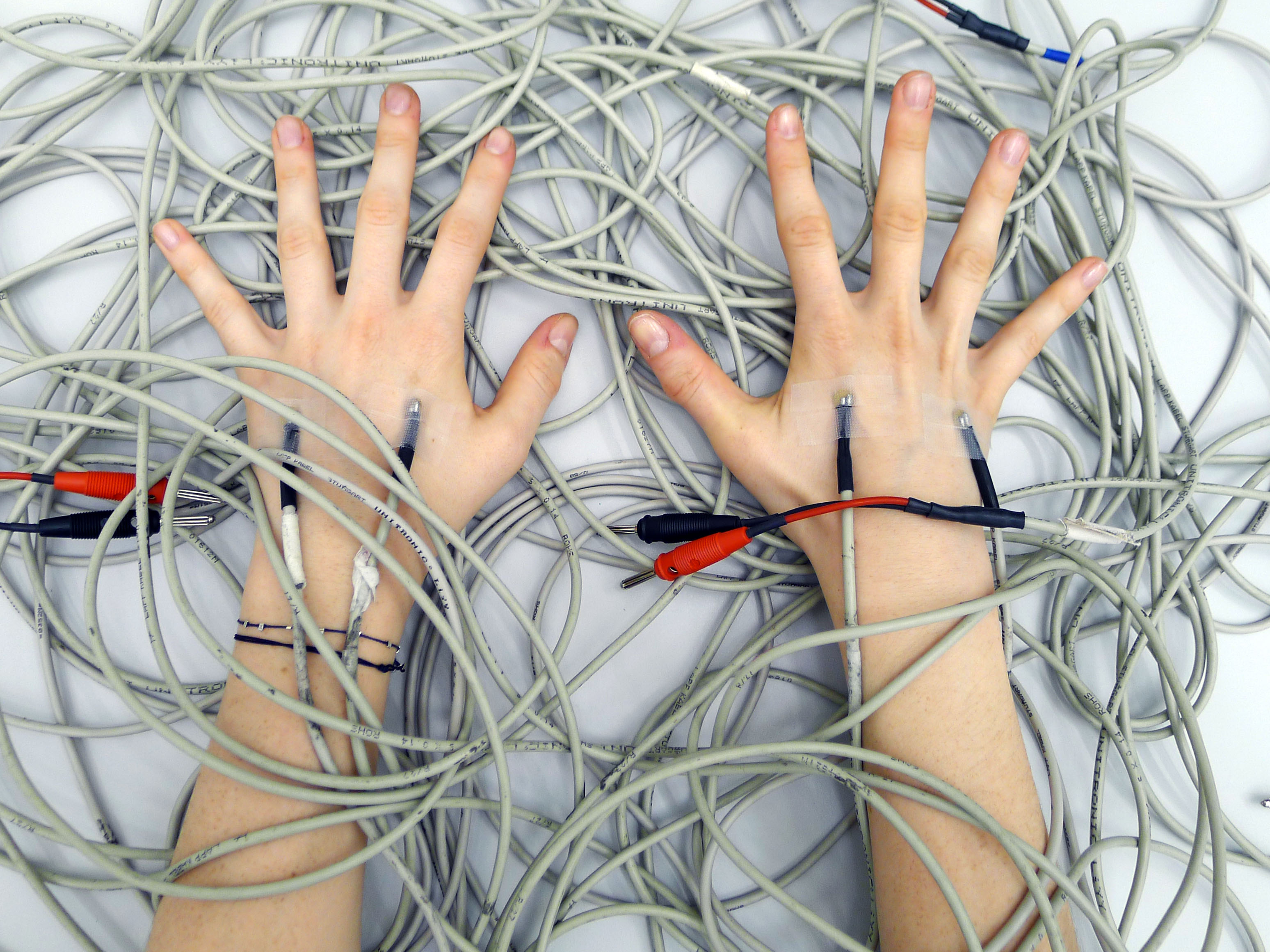
Interviews
-
DiscoverPhDs asked me about my PhD research, what a typical work day looks like for me and what enjoyments and challenges my PhD entails. Have a look at the full interview.
-
1 Million Women in STEM (1MWIS), a global network providing the stories of women studying & working in STEM, asked me what I do, why I chose this field of research, what I would tell my younger self and why I love working in STEM. Have a look at my answers.
-
Check out the German interview I did for my Twitter takeover at Real Scientists DE in May 2020.
Other Activities
Project Encephalon
I am part of the scientific advisory committee of Project Encephalon, an “international, trainee-led non-profit organization for neuroscience enthusiasts”.
MyMind
I support Brain Hero, a startup company in Vienna, as an external scientific advisor. They are developing a neurofeedback game to improve concentration levels and relaxation capabilities in individuals with autism spectrum disorder and attention deficit hyperactivity disorder.
Participate
I run an informal mailing list where I forward PhD and postdoc positions I come across. To join, send me an email at helena.hartmann@uk-essen.de.
Lab studies in Essen (for German-speakers)
- Have a look at the currently running studies and trials in the Bingellab here and our collaborative research center here.
Lab studies in Amsterdam
- Here you can sign up to stay informed about current or future studies at the Social Brain Lab.
Lab studies in Vienna
-
Check out the SCAN-Unit Facebook Page to find out about current studies.
-
Sign up on participants platforms of the Laboratory Administration for Behavioral Sciences or the Vienna Cognitive Science Hub to get regular study invitations in your inbox.
